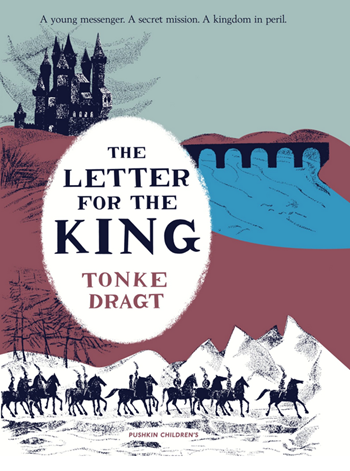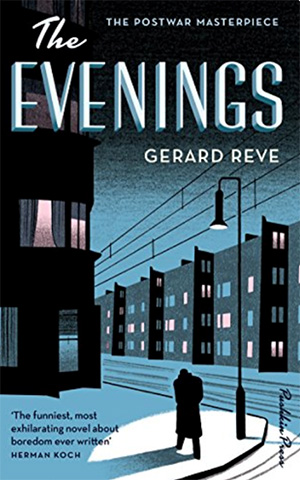Petje af to Pushkin Press!
Melissa Ulfane had an ambition: she wanted Brits to read more ‘intelligent, well-written’ novels from all over the world. That is why, in 1997, she founded Pushkin Press. Since then, the landscape of foreign literature in English translation in the United Kingdom, the United States and other Anglophone areas has changed significantly. “Well, there didn’t seem to be anyone doing what I wanted to do”, she said in an interview with The New York Times in 2006. “I travel a lot, and I would see how beautiful the Italian and the French books are, and I couldn't understand why no one was doing that here.”

Leafing through the Pushkin Press catalogue, we come across titles by writers such as Stefan Zweig, Julien Gracq, Herman Hesse, Antal Szerb, and Sören Kierkegaard. All in aesthetically pleasing and distinctive dustjackets, and making it clear that this independent London based publisher wants its readers to look beyond the Anglo-American-dominated book market. The rather eclectic list encompasses novels, non-fiction, crime fiction, and children’s books. Timeless classics sit next to contemporary texts.
Pushkin press – not directly named after the Russian author but after Ulfane’s cat – issued its first catalogue in 1997, featuring mainly books that were recommended by friends. “What is the book you would most like to give to a friend if it was in English?”, Ulfane would ask them. The great breakthrough came with the discovery that the work of Stefan Zweig was out of copyright and that the English rights were available.
Adam Freudenheim

In 2012, Pushkin Press was sold to former Penguin Classics publisher Adam Freudenheim, who to this day runs the company and remains committed to bringing ‘a large variety of voices’ and ‘the world’s best stories’, usually for the first time, to Anglophone readers: “We're finding writers from Japan, Finland, Sweden, South America and the USA who've never been published here before, but who have won great acclaim in their own countries. That is really what Pushkin Press is about. It's about finding these gems from all over the world and bringing them to new audiences.” Their readers are not only live in the United Kingdom and the United States, but also in Australia and New Zealand, Canada, Africa, India, Asia, the Middle East, Latin America, and the Caribbean. “I do have a sort of missionary zeal about what I do, but that’s because I do care deeply about literature from all over the world (…). It’s exciting to bring something into English for the first time.”
Pushkin Press’ first successful venture into Dutch literature came in 2014 when it published the first English edition of Tonke Dragt’s childhood classic De brief voor de koning (1962), in a translation by Laura Watkinson. The Letter for the King was named ‘Book of the Year’ by several critics and proved to be so popular that, in 2020, Netflix turned it into a series. That, in its turn, boosted the appetite for more Dutch and Flemish literature, especially now after the Nordic Noir, i.e. Scandinavian crime fiction that didn’t only do well on paper but also on television, English readers were looking for books from other nearby yet lesser known languages and cultures.
The evenings

Pushkin’s most remarkable achievements when it comes to Dutch literature was its acquisition of the rights of Gerard Reve’s De avonden (1947), a novel that holds an almost mythic status among its native readers and was, after a number of failed attempts, deemed ‘untranslatable’. According to Freudenheim, De avonden, “is generally considered in the Netherlands the best novel ever or of the twentieth century at least and had never been in English before, not for lack of interest but partly because the author was a bit difficult and, you know, had his own ideas about it, and it was only quite a while after his death that it happened.” In 2016 The Evenings appeared in its long-awaited and wonderfully fresh English rendering by Sam Garrett. It became one of Pushkin Press’ biggest hits.
“This was front page news in the Netherlands! I’m not kidding: every single newspaper, it was covered on tv and radio”, Freudenheim explains in a podcast interview, “but the gratifying thing was that actually the book ended up getting a great reception in English: it was called a masterpiece in The Guardian and The New York Times.”
The Evenings was indeed hailed in the Anglophone press as “a cornerstone manqué of modern European literature”. The Times Literary Supplement shouted: “Hats off to Pushkin Press and the outstanding translator, Sam Garrett, for making this odd, orphaned masterpiece available at last to an English-speaking readership.”
Raising profile
Since the English translation of De brief voor de koning and De avonden, and since the Netherlands and Flanders have been guest of honour at the Frankfurt Book Fair in 2016, the profile of Low Countries literature was raised, leading to a sharp increase in translations out of Dutch. “We have done a lot of Dutch literature since, and I can’t put my finger on something particularly Dutch about the books that we’ve done’, Freudenheim says in an interview from 2018. The success of The Evenings has led to two more publications of Reve’s early works: a pair of novellas from 1946 and 1950, which appeared together as Childhood (2019) and were also translated by Sam Garrett.
Apart from Dragt and Reve, other Dutch and Belgian fiction and non-fiction writers who found their way to English and American bookshelves via Pushkin Press are Onno Blom, Peter Buwalda, Louis Couperus, Willem Frederik Hermans, J.S. Margot (English pseudonym of Margot Vanderstraeten, Eva Meijer, Erwin Mortier, Jeroen Olyslaegers, Gerard Reve, Annet Schaap, Annie M.G. Schmidt, Jan Jacob Slauerhoff, Jan Terlouw, Manon Uphoff, and Hilde Vandermeeren. Although the July-December 2022 Catalogue does not feature any new writing from the Low Countries, Dutch and Flemish writers form about 10% of the total Pushkin list.
It certainly looks like Dutch and Flemish literature have found a new and warm nest in London. In a literary market dominated by Anglo-American writing, Pushkin Press is clearly punching above its weight. Hats off to Pushkin Press indeed!
(Filip De Ceuster, with special thanks to Gemma Blacker - University of Sheffield)
References
Goldsmith, R. (2012): ‘Pushkin Press: rising to the challenge’, in: BookBrunch. Accessable. https://www.bookbrunch.co.uk/page/free-article/pushkin-press-rising-to-the-challenge/
ZTR Radio (2018): Pushkin Press - Found in Translation (podcast). https://www.podomatic.com/podcasts/ztradio/episodes/2018-11-18T04_32_11-08_00
